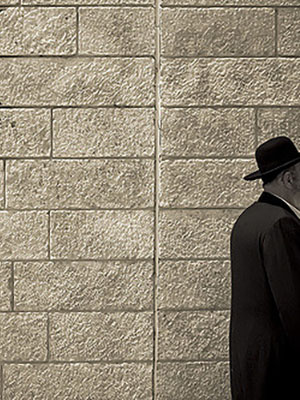I have read with dismay Jessa Crispin’s interview with Shlomo Sand, the anti-Jewish Jew (he renounced his religion in his book How I Stopped Being a Jew) and the anti-Israel Israeli (as he details in this interview). The animus he bears toward Judaism and Israel vies with that of non-Jewish anti-Semites who seek to deny Israel as a homeland for the Jews. Although Crispin did not intend it this way, the “fever” and “fractured sense of self” she speaks of in her introduction accurately capture the conundrum of Shlomo Sand. Sand’s own roots (renounced or not) do not give him license to make blanket generalizations, outright false accusations, and other specious arguments. I appreciate the opportunity to respond to this piece.
Crispin notes that Sand has earned “the ire” of such Jewish publications as the Tablet and the Forward. Those two are left-leaning journals that do not shy away from criticizing Israel’s actions. The Tablet’s and the Forward’s objections to Sand carry a great deal of authority. Writing in the Forward in a review of Sand’s How I Stopped Being a Jew, the critic Gordon Haber observes that
Shlomo Sand is an Israeli academic trained in the history of 20th-century France. More recently he has turned his attention to his native country. This is no big deal: Many serious scholars, over the course of a career, shift to other topics. But when it comes to Israel, Sand is less historian than upper-middlebrow conspiracy theorist.
I will begin by rebutting Sand’s false premise regarding Jewish identity, which Crispin recaps in her introduction. Sand maintains that the Jews are a religious group and “that is that.” The broader truth is that Jews are both a religious group and a people. Each Jew places himself somewhere on that continuum. Tumbling down the path of twisted logic that descends from his false premise, Sand goes on to claim that Jewish national identity is a myth and negates thousands of years of Jewish peoplehood. His incorrect presumption allows him to argue against Israel as a Jewish state and Jewish homeland. It is fine if he personally considers the Jews to be only a religious sect, but other Jews have other deeply held concepts of their identity. One has the right to self-determination.
Sand decries “50 years of occupation” by Israel of the West Bank; that is, he is dating the problem from 1967 when Israel took control of the West Bank in the Six-Day War. With the exception of some right-wing Israeli settlers whose presence on the West Bank is a roadblock to peace, the vast majority of Israelis do not want Israel to control the West Bank. The goal is for the Palestinians and the Israelis to negotiate together as partners and to create a Jewish Israel and an Arab Palestine, two separate countries. The West Bank Jewish settlement activity has to cease and most likely the settlements have to be dismantled and/or traded in some kind of land swap, and this would be part of a host of complex arrangements that I cannot begin to fathom.
Although Sand does not mention this, something else has to cease: Palestinian rocket attacks and weapons-tunnel smuggling from Gaza and spates of stabbings, vehicular attacks, and other assaults on Jews by Palestinians both on the West Bank and in Israel proper. This wave of violence was especially fierce in 2015, as reported by the Jerusalem Post. One of the duties of a country is to protect its citizens, and Israel must and does respond to the Palestinian attacks. While Israel’s response has often been harsh, sometimes too harsh, and Israeli military rule in the West Bank has a negative impact on the lives of the Palestinian community, it remains that these attacks by Palestinians spark the cycle of retribution. When the Palestinians stop attacking the Jews, a space can be made for dialogue and peace. Again, Sand mentions nothing about the Palestinian attacks that provoke the cycle of violence and response. He goes even further to blame only Israel for the stalemate, charging that without outside pressure Israel would continue “the occupation for 100 years or more.” This is part of his one-sided approach.

It is regrettable that Sand resorts to name-calling and blanket generalizations in which he labels Israel as “racist” and “the most racist state in the Western world.” His charge is baseless and launched not from facts and data, but from his “fever,” that term Crispin used in her introduction, which so accurately describes Sand. Sand says nothing of prejudicial attitudes of Palestinians. Here’s some information on that: According to the ADL GLOBAL 100, the Anti-Defamation League’s 2014 survey (the most current year for which statistics are available), 93% of people in the West Bank and Gaza hold anti-Semitic attitudes. I would call that extremely racist or bigoted or prejudiced or whatever synonym for intolerant you wish to use. Once again, Sand proves himself to be one-sided and propagandistic.
On the topic of rights, Sand declares that Arab-Israeli residents of Israel proper have no “civic rights” in Israel. As Sand states, “I’m speaking of the people who have residency. I’m not speaking of the occupied territories.” His statement defies reason. Palestinians living in Israel have equal voting rights, and as the Jerusalem Post reported in its recap of the 2015 elections, there are now 17 Palestinian Arab members of the Knesset. In light of this, one would hardly be correct in claiming, as Sand does, that the Palestinians have no “civic rights.”
Then there is the matter of the Boycott, Divestment, and Sanctions (BDS) Movement, which seeks to stigmatize and delegitimize Israel and exclude it from cultural and educational exchanges, international business, and other activities. Sand, along with Israel’s most implacable enemies, favors BDS. Sand alleges that he supports it to force Israel into moving out of the West Bank, but, as I point out above, cessation of Palestinian terrorist violence and cessation of Jewish settler activities are the real keys to this move. BDS is basically an attempt to isolate and stigmatize Israel under the mock position of asserting high moral principles. In a self-serving comment, Sand says that he is not in favor of the BDS academic sanctions because he is an academic himself. He is pro-BDS as long as it does not apply to him.
As I stated previously, the ultimate goal is to establish a safe and secure Israel as a homeland for the Jews and a safe and secure Palestine as a homeland for the Palestinians. This is the two-state solution. The Israelis have favored a two-state solution ever since the partition of British Mandate Palestine in 1947. There would have been an Arab Palestine and a Jewish Israel from the get-go. Unfortunately, the Arabs refused the partition plan, attacking Israel and forcing it to fight its War of Independence. Decades of wars and attacks ensued. Thankfully in 1993, the PLO recognized Israel’s right to exist, making hope for peace possible. Little by little, progress has been made. But the course is jagged, and there is so very far to go.
Finally, Sand goes on a tirade in which he alleges that there is nothing such as secular Jewish culture. But this is non-kosher baloney. There are plenty of Jews, indeed, more and more American Jews, who consider themselves culturally (read secularly) Jewish without being religiously Jewish. To be culturally Jewish is to be aware of Jewish history and your Jewish or Jewish-and-mixed family history, to have that taste for wry humor and matzoh ball soup and falafel and Jewish novelists, poets, and playwrights; it is to value literacy and learning in English or Spanish or Russian or whatever your native tongue is, even if you can’t tell an aleph from a bet.
I do not think that Shlomo Sand’s thinking is very helpful. When, as one day soon I hope, the peace process begins anew, I wish the negotiators on all sides much wisdom, goodwill, courage, and luck. •
Images courtesy of Beny Shlevich and Stefano Corso via Flickr (Creative Commons)




